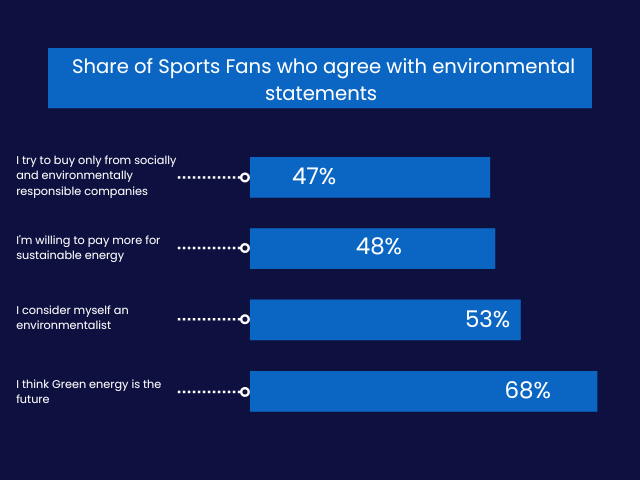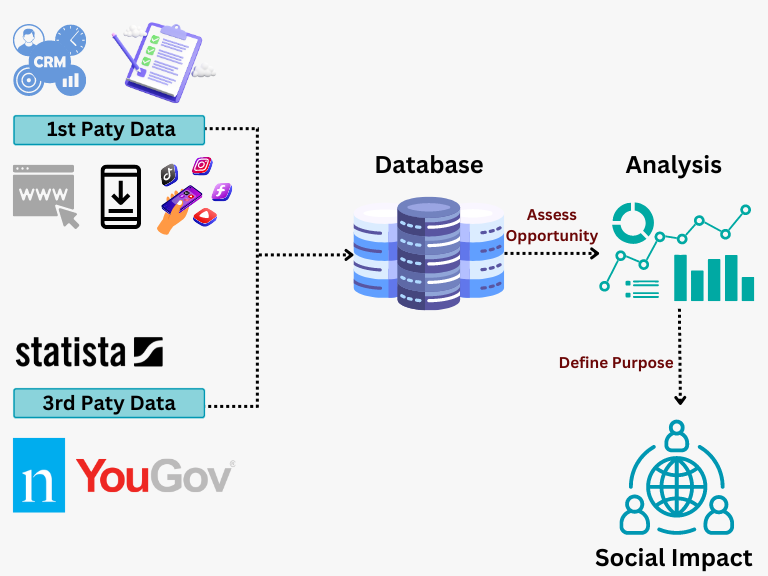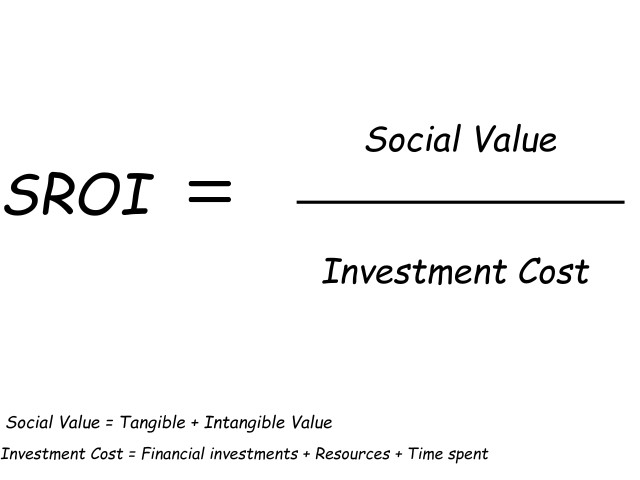Driving Impact through Data: The Purposeful Journey of Sports Clubs

Understanding Fan Behaviour
Your organisation's growth depends on your fans achieving their purposes, hence it is imperative to understand what they truly value. The more you comprehend your fans, the better you can authenticate their values and purpose, enabling you to tailor your campaigns to cater to their needs effectively.
Understanding their sentiments helps your organisation align its initiatives better and foster a stronger bond with your fan community.
For a sports organisation, this can emerge from something as basic as the transactional behaviour of the fans. Fan spend can paint a picture of their preferences and bring out a trend. Furthermore, collecting attitudinal data through market research (example below) and sentiment analysis techniques can provide valuable insights into what your fans say about your brand values and purpose.

Data Collection
To gain a comprehensive understanding of your fan base and inform purpose-driven initiatives, consider utilising the following data collection methods:
- First-Party Data: Leverage existing data sources within the organisation, such as fan interactions, surveys, and feedback, to gain valuable insights into fan preferences and behaviours. For instance, tracking ticket purchases and merchandise sales can reveal trends in fan interests, such as a surge in demand for eco-friendly team merchandise, indicating growing environmental consciousness among fans.
- Third-Party Data: Integrate external data sources, such as social media trends and market research, to gain a broader perspective on fan sentiment and societal challenges.
Assessing Social Impact Opportunities
Analysing global trends and reports can help you identify pressing social issues that align with your purpose and your fans' values. By selecting opportunities that resonate with your audience data, you can create a sense of shared purpose with your supporters and strengthen their emotional connection with your organisation.
For example, data analysis might reveal an increasing focus on gender equality among fans, prompting the organisation to design purpose-driven campaigns promoting gender inclusion in sports.
Data-Driven Purpose
Data should serve as the compass to drive meaningful initiatives that align with your purpose, fan interests, and societal needs. Based on insights from different data and trends, craft an authentic purpose that resonates with your fans.
Ensure that your purpose statement evolves over time based on social needs and fan engagement. An adaptive approach demonstrates your organisation's commitment to making a meaningful impact on an ongoing basis.
For instance, analysing fan feedback and sentiment data over time might indicate a shift in fan values towards sustainability. As a result, the organisation can adapt its purpose to include environmental stewardship, resonating authentically with its eco-conscious fan base.

Tracking Purpose-Driven Campaigns
While traditional Key Performance Indicators (KPIs) have their place, it is recommended to incorporate consumer-focused metrics, such as the Fan Performance Indicator (FPI), to gain a deeper understanding of fan engagement and impact.
FPI is a set of metrics specifically designed to gauge fan satisfaction and engagement with purpose-driven initiatives. By focusing on fans' experiences and perceptions, FPI provides valuable insights into the effectiveness of purpose-driven campaigns. Some examples of FPI metrics include:
- Satisfaction Score: How satisfied fans are with the purpose-driven initiatives and the overall brand experience.
- Net Promoter Score (NPS): Indicator of fan loyalty and advocacy, determined by the likelihood of fans recommending the organisation to others.
- First Response Time: The speed and efficiency with which the organisation responds to fan inquiries and feedback.
- Retention Rates: The rate at which fans continue to engage with the organisation and its initiatives over time.
- Quality of Service: An assessment of the quality of services provided to fans, reflecting the organisation's commitment to meeting their needs.
Measuring Social Impact
Measuring the social impact of purpose-driven campaigns can be challenging, as it often involves assessing intangible outcomes and long-term effects. However, by calculating the Social Return on Investment (SROI), sports organizations can quantify the transformative value of their initiatives.

For instance, a calculated SROI of 1:10 means that every £1 invested generates £10 worth of social, environmental, and economic value, showcasing the far-reaching impact of purpose-driven strategies.
Case Studies
- Everton FC: Everton in The Community (EiTC)
Everton FC is widely known as 'The People's Club' for a reason. Its charitable arm EiTC is driven to better the lives of the people of Liverpool. The club has been using data to power its engagement strategies and community initiatives.

- Data Collection Strategy: The club aggregate the data from various touchpoints (ticketing, socials, retail, emails etc.) and brings it into one repository to create a single fan view, in Salesforce. A layer of demographic and location data is taken into account to understand fan behaviour effectively.
"Whilst we are extremely proud of this growth in return-on-investment and what it represents, we refuse to rest on our laurels and are committed to increasing our reach and helping as many people as possible" - – Sue Gregory, Everton in the Community Cheif Executive
- Community Engagement: By leveraging the collected data, Everton FC can personalise communications and establish an authentic connection with their fans. This approach allows them to better understand their fans' needs and align their initiatives with fan values and community needs. For instance, several check-in calls were made, during the Covid pandemic, to vulnerable people who were identified based on past data collected on them.
Impact:
- Generated £64 million for its community in 2021.
- £8.7 million increase in social value during the 2021-22 season.
- For every £1 invested in EiTC, a remarkable societal value of £14.74 was generated.
- 240 volunteers impacted the lives of 14.5k people.
2. Golden State Warriors:
Aside from being a formidable NBA team, the Golden State Warriors are also a purpose-driven organisation who utilises data for their campaigns and innovations. Their offering goes beyond basketball and focuses on creating an incredible experience for their fans. They embrace a data-driven approach to co-create with their supporters, getting their feedback to drive purposeful initiatives.

- Data-Driven Co-Creation: The Warriors co-create with their supporters by getting their feedback and making them part of the design process. A 19% gain in their Net Promoter Score (NPS) validates their efforts and reflects strong fan loyalty.
- Diversity and Inclusion: Using market research methodologies and AI-powered tools, the Warriors measure the impact of their initiatives and identify new opportunities to create a more inclusive experience.
- Purposeful Decision-Making: The Warriors prioritize diversity and inclusion in their decision-making process, ensuring that their initiatives align with the values and needs of their fan community.
"Diversity and inclusion are at the core of what we do. It's the lens through which we make a lot of our decisions" - Erin Dangerfield, Senior Vice President of People and Culture
3. Sport England: Moving Communities
Sport England initiated "Moving Communities" to understand the role of leisure centres on community well-being by exploring their effectiveness, performance and financial viability.

"Data from the Moving Communities tool is essential for helping us understand who’s returning to activity and who’s not; we can then use this knowledge and insight to support communities all over the country to get back to their local leisure centre.” - Tim Hollingsworth, CEO, Sport England
- Data-Driven Insights: The initiative is driven by the largest data set collected for the sector, providing valuable insights into community needs and preferences. By analysing this data, Sport England identifies key focus areas and opportunities for meaningful impact.
- Supporting Communities: With data-driven knowledge, Sport England supports communities across the country in returning to their local leisure centres. This initiative plays a vital role in enhancing community well-being and promoting physical activity.
Ready to revolutionise the sports industry through data-driven purpose?
Be part of the conversation and share your thoughts! I'd love to hear your ideas and experiences on co-creating with sports fans and driving positive social impact.
Comments ()